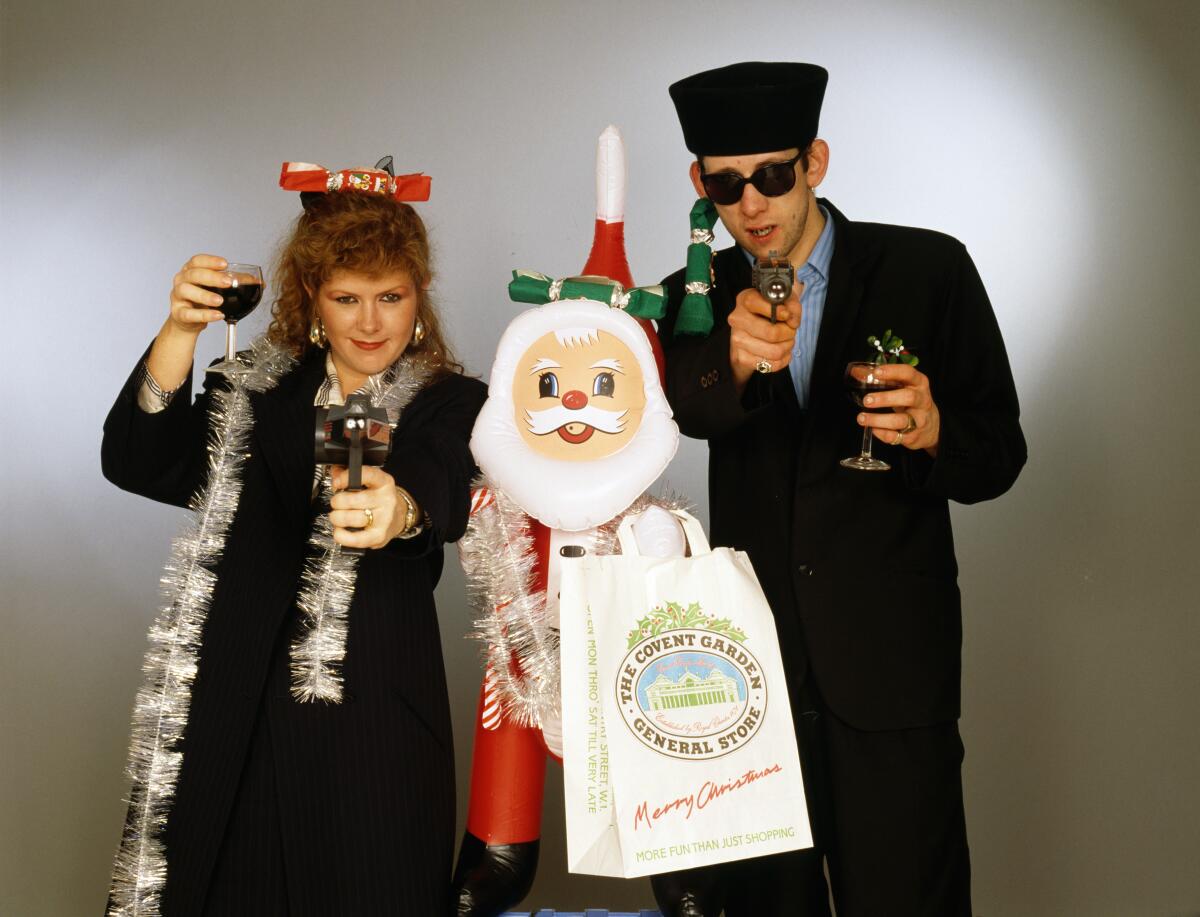‘You scumbag, you maggot’: For broken romantics, nothing says Christmas like ‘Fairytale of New York’

- Share via
A reading from the book of Shane MacGowan:
It was Christmas Eve, babe, in the drunk tank
An old man said to me, “Won’t see another one”
And then he sang a song: “The Rare Old Mountain Dew”
I turned my face away and dreamed about you
Have you ever heard a better opening to a song than that one, from “Fairytale of New York” by MacGowan’s Irish folk-punk band, the Pogues? In just four lines, he’s drawn an indelible scene with lifelike characters rooted in a specific cultural context facing high emotional stakes; all of a sudden, you desperately need to know how this guy ended up in jail and who it is he’s dreaming about. He continues:
Got on a lucky one, came in 18-to-1
I’ve got a feeling this year’s for me and you
So happy Christmas — I love you, baby
I can see a better time when all our dreams come true
Set to a tender yet stately melody, the words are so vivid that you can almost imagine any singer finding success with them, as indeed many — among them Ed Sheeran, Jon Bon Jovi and, uh, Travis Kelce — have attempted to do.

But in the 3½ decades since the Pogues released “Fairytale of New York” in 1987, no one has come close to equaling what MacGowan, who died Thursday at age 65, captured in the original, which he recorded as a duet with Kirsty MacColl. To hear MacGowan sing the song, his smoker’s rasp wobbly with Guinness or whiskey (or both), is to be inside that drunk tank with him, plastered for sure but not so far gone that you’d consider your sorrows drowned.
He slurs his words, he lags behind the beat, he reaches for notes he can’t quite grab — it’s a gorgeous mess of a performance complemented perfectly by the coolly astringent MacColl, who comes in as the narrator’s former lover and engages him in a profane back-and-forth about their days as Irish immigrants fresh to New York.
“You’re a bum, you’re a punk,” she tells him, to which he responds, “You’re an old slut on junk.” The insults keep escalating — MacColl calls him a “scumbag” and “maggot” before using a homophobic slur that later brought controversy to the song — until the music softens for a bridge in which MacGowan pleads, “I could have been someone.” MacColl’s response, delivered with brutal practicality: “Well, so could anyone.”
The Pogues’ Shane MacGowan, who died Thursday at age 65, fancied himself in the tradition of great, doomed Irish poets. He was right on both accounts.
This combination of songwriting and performance is what makes “Fairytale of New York” one of the great holiday songs of the modern pop era, up there with Donny Hathaway’s “This Christmas,” “Last Christmas” by Wham! and Mariah Carey’s “All I Want for Christmas Is You.”
Yet each of those ingeniously composed singles features a virtuoso vocalist whose flawless technique embodies the same ideas of beauty and magnificence that define the holidays in both their religious and consumerist guises; the songs are neat, pristine, fundamentally aspirational. MacGowan — born, it’s worth noting, on Christmas Day in 1957 — is doing something different in portraying the resentment and the disappointment that Christmas breeds for many, even as the narrator, backed by swelling strings and piping tin whistle, goes on to admit he’s not immune to the promise of redemption raised by that long-shot win at the racetrack.
“You took my dreams from me,” MacColl sings; “I put them with my own,” MacGowan replies with a shrug — a romantic’s explanation that he knows fails as an excuse.
In the holiday canon, “Fairytale” represents a uniquely complicated layering of feelings, which perhaps is why various members of the Pogues (including the tune’s co-writer, Jem Finer) have said it took them two years to get it right. They tried it with different words; they tried it with the group’s Cait O’Riordan in the woman’s part before she quit the Pogues.
Tired of chestnuts roasting on an open fire? Here, 50 new Christmas classics — from pop to hip-hop to folk to glam-rock — from the past half-century.
The song, which has more than 400 million plays on Spotify and YouTube, peaked at No. 2 on the U.K. singles chart in December 1987 — just one place shy of the top spot that British pop acts battle passionately to occupy during the week of Christmas.
After MacColl’s death in 2000, the Pogues performed the tune live with other singers including MacGowan’s longtime friend Sinéad O’Connor, who died this past summer; since 2005, “Fairytale” has reentered the U.K. chart on an annual basis amid shifting opinions on the part of fans and broadcasters as to whether the gay slur should be censored or construed as the language of a desperate and unwholesome character. (MacGowan took the latter position, though he also said he was “absolutely fine” with the word being bleeped.)
What the song has never done is hit No. 1. Might that change this Christmas on a wave of appreciation for the man who wrote those wonderful words, then laid waste to them with his rusty switchblade of a voice? The gloriously scarred “Fairytale of New York” warns against hoping for such a happy ending.
Right?
More to Read
The biggest entertainment stories
Get our big stories about Hollywood, film, television, music, arts, culture and more right in your inbox as soon as they publish.
You may occasionally receive promotional content from the Los Angeles Times.













